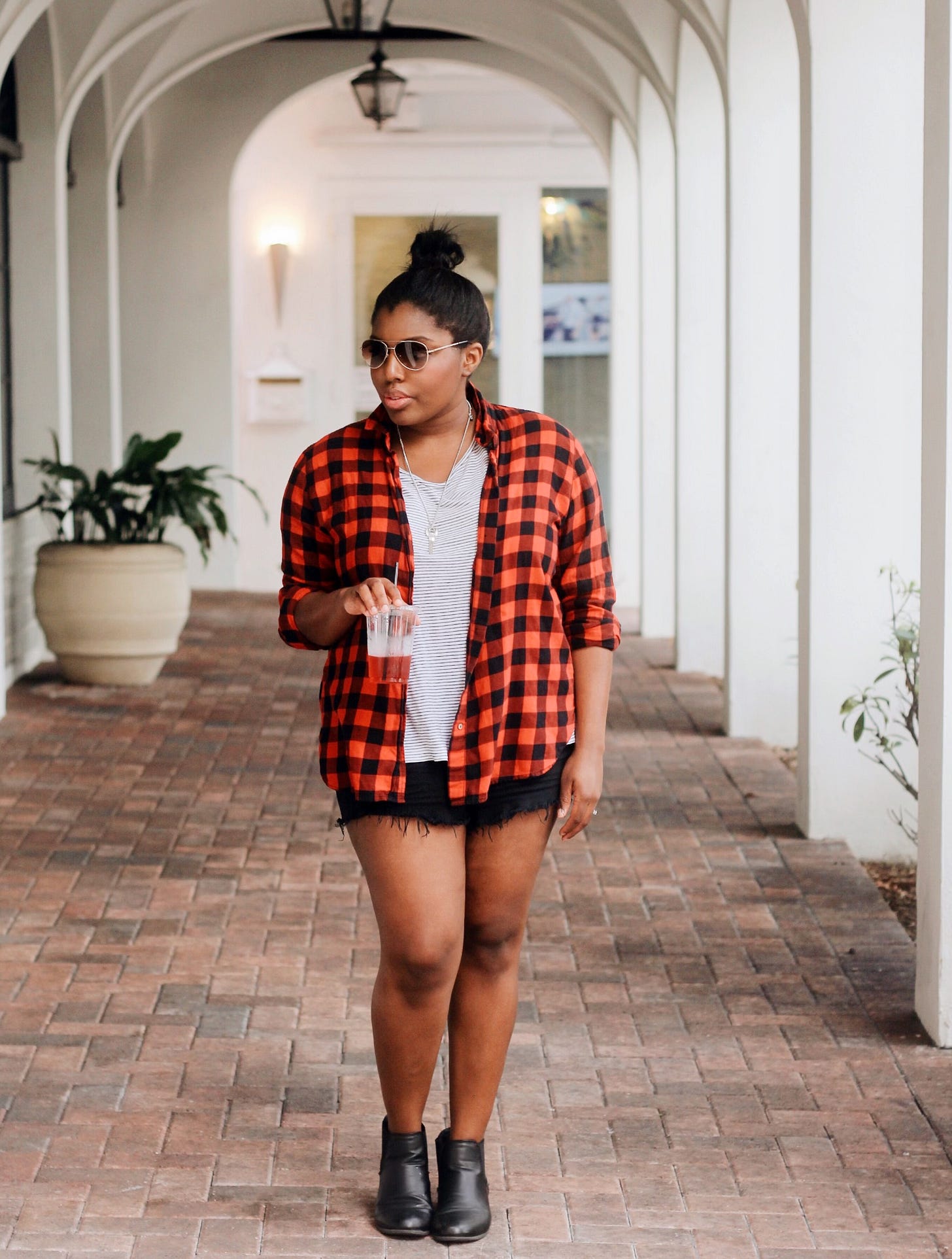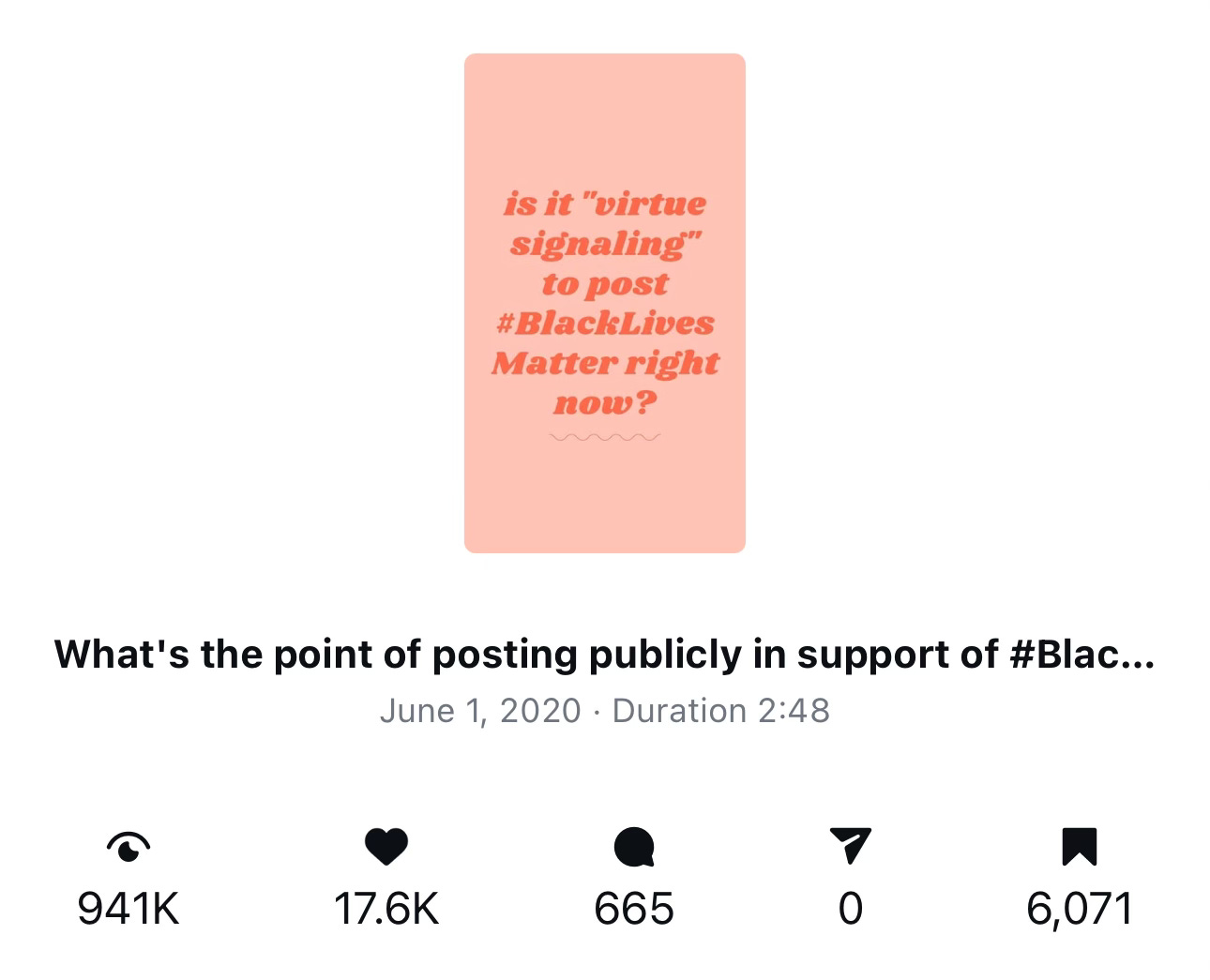I bought a domain for $20, pulled out my digital camera, and went for it.
Call it ambition or maybe hubris. I had a couple thousand followers on Instagram, most of who I knew in real life. I wondered what my friends thought as I posted my daily makeup routine and the best Old Navy Black Friday deals. My husband, God bless him, dutifully took my pictures, letting me drag him all over town in search of the shot. Was it all cringe? Probably. But a small part of me dreamed of becoming an *~influencer~* and all that it entailed — blue checkmark, plenty of followers, and, of course, making decent money. I’m not sure I knew what I was getting into.
The email came seven months after I started the blog. A brand wanted an in-depth blog post, along with posts on Facebook, Instagram, and Pinterest. In exchange, I’d receive a $70 product. They were ripping me off, but that’s only clear in retrospect. Back then, the attention was a positive sign, confirmation that I was really doing something. I may have been fueled by delusion, but I started to envision a future life as a full-time blogger. I balanced my marketing job with content creation, opting for photoshoots on my lunch breaks and writing blog posts on weekends. Truthfully, it was more of a hobby than a side hustle — I was making less money than I put in. But slowly, the partnerships became more appealing, and the affiliate links became more profitable. In 2019, I quit my job.
Most of my new income came from freelance work, but the brand deals were a factor. I charged $500 for an Instagram post, which wasn’t enough to pay my bills but still helped. I was happy with my career. Being a full-time influencer wasn’t my focus anymore. Of course, I would’ve loved more followers, more flattery, more money — who wouldn’t? But I felt peace with what I had.
Then, I filmed a video that changed everything.
I gained tens of thousands of followers. My words were shared by celebrities. Big-name influencers reached out. Honestly, it was weird. My feelings were all over the place about the reason I was so popular overnight. Suddenly, white people felt pressure to reckon with systemic racism, and somehow, following a Black creator was the result. I was swamped with messages asking basic questions about racism that a quick Google search would’ve solved. I, ever the people-pleaser, spent hours responding to hundreds of DMs a day.
I had it all, but I couldn’t shake the reason why it was happening. I shared my viral video after the murder of George Floyd as the national attitude toward Black Lives Matter started to shift. (The momentum wasn’t permanent; only half of Americans supported the movement in 2023.) Part of me worried that people would think I was cashing in on a horrific tragedy. I didn’t want to take advantage of the moment. You could argue that I didn’t ask to be perceived by nearly a million people and didn’t seek out media appearances and podcast invites. But I felt conflicted.
Life got even stranger every time I checked my email. Out of nowhere, brands wanted me. My inbox overflowed with so many partnership offers that I hired a talent agency to handle it for me. Long gone were the days when I made a few hundred dollars per collaboration. My biggest partnership paid me more for three Instagram posts than my previous full-time salary. I was only a micro-influencer, but the pay was great. It was more money than I ever thought I’d see. Still, I had this internal conflict that I couldn’t get rid of. Did everyone pity me, or was it all performative? I didn’t want to be the token Black person.
As I wrestled with my emotions, the deals got even better. I got paid to go to Europe. A couple of months later, I attended the US Open. The invitations were coming in so fast that I said no to easy opportunities with brands I loved. I took a month away from sharing sponsored content, and it felt like I could exhale. Was the work fulfilling? Honestly, it’s hard to say. I felt prouder of myself when an essay made an impact than when a post got a high number of impressions, that’s for sure. But it was a lot of fun, and I thought it’d never end. Why would it?
In 2020, I was stressed about paying myself during my maternity leave. The following year, I made $141,475 from brand deals, not counting affiliate income and freelance projects — quite the change. I debated sharing this, but I’m nosy about money, and you probably are, too. Still, it feels a bit like I’m taking off my clothes. Uncomfortable. Embarrassing, even. But you have to know this to set the stage for where I’m currently at. After all, this isn’t a story about me breaking up with the industry. It’s about influencing breaking up with me.
We’re four months into the year, and I’ve made nothing from partnerships. Zero dollars. I’ve had a couple of emails come in but nothing that’s appealed to me. The slowdown has been gradual. Last year, my take-home from brand work was under $10,000. I’m still financially secure, but my salary is much (much!) less than it was. Some days, I can’t help but wonder where I went wrong. Why did the deals stop? Putting in less effort is probably part of the problem. In recent years, I got tired of shopping the Nordstrom sale for stuff I didn’t need and obsessing over why a post didn’t perform well. But before I burnt out, I was nearly unstoppable.
I paid $1,100 every month for Pinterest and blog graphics and $500 to an Instagram growth coach. I set quarterly goals for improving my engagement and growing my newsletter mailing list. (These days, I make it a point to ignore the Substack metrics dashboard.) When I lost followers, I couldn’t stop thinking about which Reel might’ve set them off. Most partnerships were a pleasure, but some brands nitpicked my submissions to the point that I cried.
Let’s play the world’s smallest violin for the influencer upset over reshooting content for a four-figure contract. Not exactly the most sympathetic character, I know. But my frustration toward the job started to mount. I found myself happier when my calendar wasn’t crowded with caption idea deadlines and tentative post dates. Writing made me a lot less money, but it felt right. I wondered if I should scale back. I didn’t realize the decision would be made for me.
You want to know the biggest advantage of all of this? I don’t have to care anymore.
If I post something and it only gets a couple hundred likes, it doesn’t matter. People unfollow me after I share something political? Goodbye! Social media is fun again. For years, I’ve felt panic about not growing or having the wrong strategy. Before, if a brand declined to work with me, I’d feel so disappointed in myself, wondering why I wasn’t good enough. It’s freeing to exist online and not have my income affected by how many people save a post. I remember a time someone in the industry asked why I reposted so many tweets and memes on my Instagram story — it could be a turn-off to brands, she told me. I felt uneasy. Would I have to become a boring version of myself to succeed? Now, I’m chaotic without any consequences. Bliss!
I allow that I might romanticize my current era to stop myself from freaking out about reality. Plenty of influencers, including some of my friends, are thriving right now. The industry is doing just fine. If I churned out high-quality content that satisfied the algorithm, things could change, and my inbox might be full again. But I’ll share a hot take that actually isn’t that ludicrous: Some of the brands that approached me in 2020 only did so because of widespread cultural pressure. Now that the public has moved on, so have they. I don’t think there’s anything I can do to bring them back. It’s a sad thought.
Do I miss it? Ignoring the hit to my ego and bank account, my current situation feels really lovely. Yes, I’ll post about products I love, and if the perfect partnership came along, I’d agree. But I no longer feel beholden. The frenzy was fine while it lasted, but being less popular is okay with me.








This was such a good read. Thank you for sharing.
I loved this. Thank you. I had far fewer followers than you (around 8k at my peak) but I treated social media like a job and felt the same way toward the end. Switching my account from business to personal last year was so freeing.